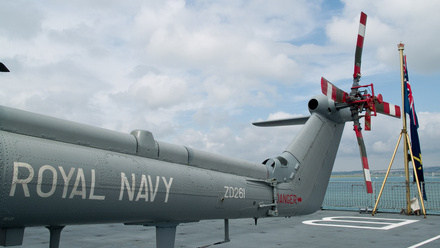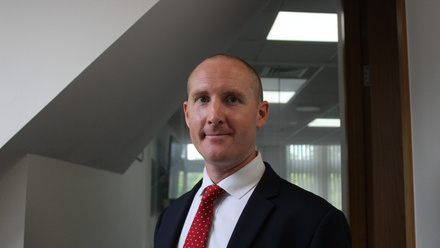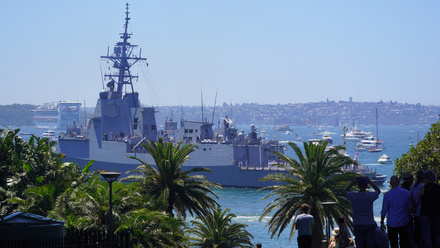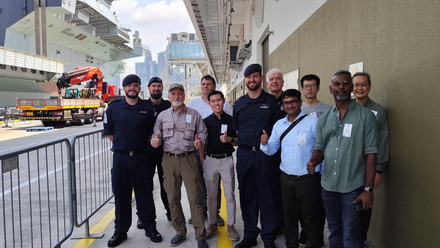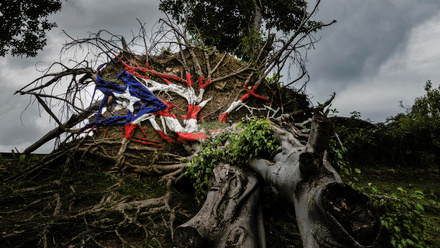The evolution of defence engineering explained
Fellow delivers lecture honouring chief engineer Victoria Drummond OBE, the first female member of the Institute.
The Britannia Royal Naval College (BRNC), Dartmouth, hosted a recent session led by Captain Ali Ashour, Senior Engineering Officer with the Kuwaiti Coast Guard and the first Gulf Cooperation Council (GCC) Fellow of IMarEST.
The talk paid tribute to chief engineer Victoria Drummond OBE, the first female member of the Institute of Marine Engineers, which later evolved into IMarEST in its modern form.
Born on 14 October 1894 in Errol, Scotland, Drummond’s determination, technical mastery, and moral courage opened pathways for generations of engineers to follow. Her name remains deeply intertwined with the Clyde’s maritime legacy and with the development of engineering ethics across the professional world.
Captain Ashour’s lecture, titled ‘Engineering the Future Fleet: AI Driven Digital Twins, SHM and C5ISR Peridynamic Analytics for Crewed and Autonomous Naval Readiness’ brought together cadets and engineering undergraduates and postgraduates from the University Royal Naval Units (URNU) and Defence STEM Undergraduate Scheme (DSUS).
As the first non-Commonwealth national to undertake the Strategic Defence Research Partnership on Autonomy between BAE Systems and the Peridynamics Research Centre (PDRC) at the University of Strathclyde, Captain Ashour’s research, under the directorship of Professor Erkan Oterkus, explores strategic feasibility, predictive analytics, digital twin integrity, and AI validation to enhance resilience and readiness across future naval and national infrastructures.
“Engineering teaches leadership through uncertainty,” Captain Ashour remarked. “The integrity that keeps a technical structure intact under stress mirrors the integrity that keeps a command team cohesive in crisis.”
He emphasised the developing distinctions between defence engineering, security engineering, and grid resilience planning, three interrelated schools of thought shaping modern strategy and leadership.
In parallel, Captain Ashour examined ESG (environmental, social, and governance) considerations as the moral compass of modern engineering. He noted that ESG frameworks are increasingly vital in shaping defence technology curricula, guiding engineers to innovate responsibly while upholding environmental stewardship, social accountability, and transparent governance.
Honouring a maritime legend
“Victoria Drummond MBE was more than a pioneer, she was a visionary who used engineering as a language to transcend rank, gender, and circumstance,” Captain Ashour reflected. “In an era defined by war, she demonstrated that leadership is not conferred by title but earned through technical excellence and moral conviction.
“Her legacy reminds us that the same spirit which enabled her to steer engines under fire must now guide us as we engineer the autonomous systems, resilient platforms, and ethical frameworks of the future.”
Captain Ashour’s engagement reflects an extension of Kuwait’s and the GCC’s commitment to knowledge diplomacy and capacity building, while also strengthening Anglo–Kuwaiti relations through technical education, shared maritime innovation, and institutional collaboration. These enduring partnerships underscore the importance of engineering as a bridge between allied nations and as a platform for sustainable global cooperation.
By engaging with future officers and engineers across allied and Commonwealth institutions, Captain Ashour’s contributions as both an IMarEST Fellow and international researcher reinforces the Institution’s mission to shape a new generation of engineers guided by integrity, ethics, and excellence in service.
As Captain Ashour concluded, “Victoria Drummond’s legacy endures not merely in history, but in every act of engineering leadership that places integrity before ambition, a principle as timeless as the Clyde from which her journey began.
“Her spirit is reawakened today as the GCC nations strive to integrate women into maritime leadership, a vision symbolically embodied by the first Kuwaiti female cadets now entering BRNC, a living continuation of the path she forged nearly a century ago.”
This article represents the views of Captain Ali Ashour and not necessarily IMarEST.
Read more about Drummond: An engineer, an owner, and a Greek shipping tragedy.
Tell us what you think about this article by joining the discussion on IMarEST Connect.
Image: attendees and speakers at the Britannia Royal Naval College. Credit: Captain Ali Ashour.

